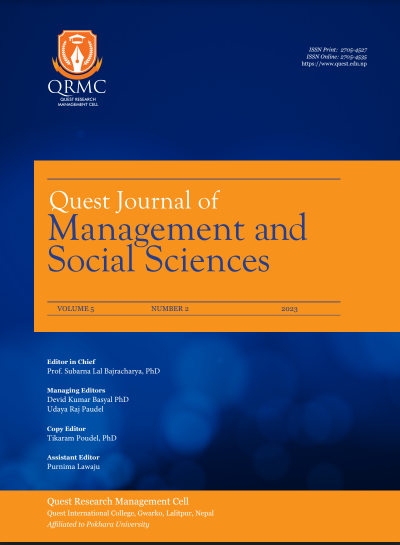Empirical Relationship between Foreign Direct Investment and Economic Growth: Evidence from Nepal
DOI:
https://doi.org/10.3126/qjmss.v5i2.60833Keywords:
FDI, Gross Domestic Savings, Economic Growth, Trade Openness, ARDLAbstract
Background: Foreign direct investment (FDI) is vital for developing countries like Nepal to access foreign capital, drive economic growth through technology transfer, open new investment and research opportunities, and harness their abundant natural resources. With Nepal experiencing a capital shortage, FDI plays a crucial role in bridging the resource gap and stimulating economic activities in the country.
Objective: The study examines the relationship between FDI and economic growth, gross domestic savings (GDS), trade openness, as well as the impact of policy (liberalisation) and security variables in Nepal.
Methods: The study employs data from secondary sources, such as the Nepal Rastra Bank, the Ministry of Finance, and the Central Bureau of Statistics, along with a database on the Nepalese economy from 1996 to 2019. The study utilises the Autoregressive Distributed Lag (ARDL) model for the evaluation and interpretation of the results.
Results: The findings of this study demonstrate a positive and statistically significant relationship between Real Gross Domestic Product (RGDP), Real Gross Domestic Saving (RGDS), and Trade Openness (Xm) with Foreign Direct Investment (FDI) inflow in Nepal in the long run. Likewise, the Liberalization Policy positively affects FDI, although it lacks statistical significance. However, the presence of poor security conditions during the civil war exerts an adverse impact on FDI inflow.
Conclusion: The empirical analysis provides compelling statistical evidence supporting the claim that Trade openness and RGDP positively impact FDI in the long run. It signifies the potential of FDI as a significant resource capable of contributing to economic growth, with trade openness facilitating the inflow of FDI in the economy. Furthermore, Gross Domestic Saving appears to be a significant determinant of FDI, as it fosters capital formation within the economy, ultimately promoting increased FDI inflows. Likewise, the success of FDI attraction in Nepal is contingent upon effective Liberalisation and Privatisation policies alongside a stable political environment, which collectively play pivotal roles in facilitating and sustaining FDI inflows.
Implications: The study suggests that policymakers should focus on the timely reformation of economic policies and should pay close attention to providing security and ensuring an investment-friendly environment. The government should encourage increased savings through the better facilities of financial institutions and promote international trade and infrastructure development.
Keywords: FDI, Gross Domestic Savings, Economic Growth, Trade Openness, ARDL
Paper Type: Research Paper
Downloads
Downloads
Published
How to Cite
Issue
Section
License
Copyright (c) 2023 Quest Journal of Management and Social Sciences

This work is licensed under a Creative Commons Attribution-NonCommercial-NoDerivatives 4.0 International License.
This license enables reusers to copy and distribute the material in any medium or format in unadapted form only, for noncommercial purposes only, and only so long as attribution is given to the creator.




